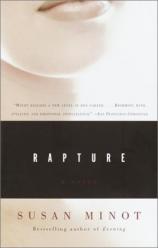Reading Group Guide
Discussion Questions
Rapture

1. Time figures prominently in Kay's and Benjamin's relationship (e.g., "Now was their time." --page 72; "They spent far more time keeping away from each other than they ever did together." --page 80). Has time, as Kay puts it, "saturated [the] relations between [Kay and Benjamin] with more meaning, not less" (page 9)? From the moment of Benjamin's first touch, linear time seems to collapse for Kay: "The moment was split for an instant by the future. It was always an unnerving sight, the future. It was uncertain. But during revelatory moments like this, the future asked for a quick consideration to test her orientation. Would this revelation take her where she hoped to go?" (page 32). Do relationships defy the normal laws of time? Does time work for or against Kay?
2. Is it true for Kay and Benjamin that "the only things truly in the past are things completely forgotten" (page 47)? What power does memory have over their relationship?
3. By reliving their relationship in their minds, Kay and Benjamin seem almost to experience it in separate but parallel universes. Where do their experiences intersect? How do Kay's and Benjamin's versions of the same events differ? For example, their conversation at the Christmas party (page 83) made an impression on both of them, but for different reasons. To what extent is either one aware of the other's point of view? If not, how does this perception or awareness affect their relationship?
4. Minot utilizes a relatively brief act of sex during which the ex-lovers mentally span the whole of a three-year relationship. Is this device effective? Are their respective recollections colored by their respective states of sexual arousal over the course of the novel? Is the particular sex act in which Kay and Benjamin are engaged fitting in light of their past or is it somehow ironic? How does the resolution of this one act relate to the resolution of their relationship?
5. Would Kay define love as simply "to give everything out and not ask for anything back" (page 98)? What might be Benjamin's definition of love?
6. Why does Kay leave Angus (see pages 86—88)? What is Kay seeking in a relationship? Is she looking for "comfort" (page 41) or to escape the "dread" of "what is going to become of [her]" (p. 36)? Does Benjamin offer what Angus did not or could not? Does Kay's happiness depend on the man she is with? What about self-regard?
7. Can the reader believe Benjamin was really in love with Kay, if to him their relationship was really just something "Vanessa would have blown … way out of proportion" (page 35)? Is Vanessa's total acceptance of him (page 60) something Kay cannot offer Benjamin? To whom is Benjamin referring when he thinks that the bridge to goodness "had burst into fire when he'd not been able to change his life for a person he loved" (page 111)? Does Benjamin's happiness turn on the woman he is with? What about his self-esteem?
8. Compare Kay's character to what the reader learns of Vanessa's character in the brief descriptions on pages 34 and 39. To what attributes is Benjamin attracted in each of them? How do Kay and Vanessa each differ from Benjamin's ideal woman (page 95)?
9. What is Benjamin really like? Minot writes at the conclusion that for Benjamin there "came a further sinking feeling, lower than all the other ones before it. A sharp little truth hunched there. Whatever goodness he thought he might have had was turning out to be less than he might have hoped" (page 114). Has his character changed, or is it just his self-awareness that has evolved?
10. What do Kay's sexual fantasies, which include "doing the job of a whore" (page 36) and finding that "her slavelike posture was arousing" and imagining "him saying crude things" to her (page 91), reveal about her? What is Kay really longing for when she thinks "If she was lucky he would break her and demean her into oblivion" (page 104)? Is "oblivion" the only way Kay can feel? Does Benjamin oblige?
11. Is Kay describing herself when she says: "[W]recks were often more likely to give a high priority to sex" (page 88)? Is her statement confined to men, or does it apply to men and women? How does sex confuse and complicate Kay's emotions? Are Kay's physical needs separable from her emotional ones? Can sex provide the merging of the physical and the emotional for Kay? For Benjamin?
12. Many of Kay's and Benjamin's musings are on gender differences. Did you find yourself agreeing with one or the other's view of gender differences? Is it the gender differences themselves that affect their relationship or their perception of gender differences? To what extent is their relationship a metaphor for all relationships between men and women?
13. Benjamin and Kay each have careers in movie-making, a producer and a production designer respectively. How do their careers symbolically reflect their romantic relationship? How else does Minot utilize the movie motif in Rapture? Where does Minot situate the reader vis-à-vis Kay's and Benjamin's mental replaying of their relationship?
14. One of the sections told from Benjamin's viewpoint is simply "He kept his eyes closed. He felt as if he were whirling down a drain" (page 65). Minot frequently employs such analogies at the conclusion of each section. (See, for example, page 38, page 43, and page 45). How do these analogies serve to underscore the point of each section?
Rapture
- Publication Date: April 8, 2003
- Paperback: 128 pages
- Publisher: Vintage
- ISBN-10: 0375727884
- ISBN-13: 9780375727887








